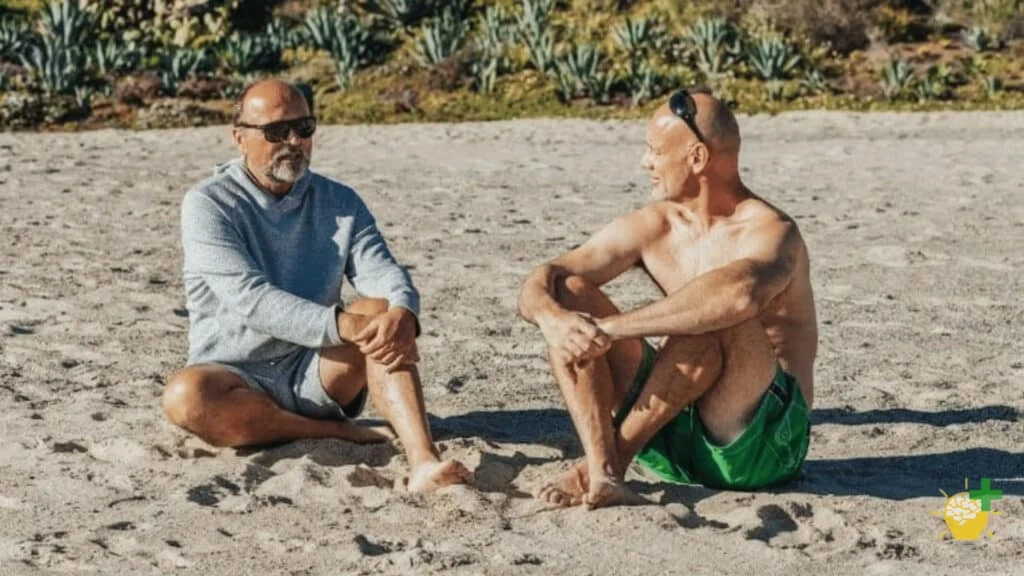Let’s cut to the chase.
If you’re reading this, I assume you have specific goals you want to achieve and already know why having an accountability partner is important.
My aim for piecing this accountability partner checklist together is simple: to help you choose the right person to support your dreams and goals.
If you’ve always wondered what makes a fine team when it comes to establishing an accountability partnership, this article is for you.
In addition to listing the most important qualities of a great partner, I’ll explain the pros and cons of choosing someone close to you as an accountability buddy versus an acquaintance.
Lastly, I’ll show you exactly how to find an accountability partner and make the partnership work.
Accountability Partner Checklist: Qualities to Look For

Choosing an accountability partner isn’t just about finding someone with similar goals as yours. You must pick someone with the right qualities, interests, and attitude to nudge you in the right direction.
Here is a checklist to help you find the right accountability buddy:
1. Compatibility
First, your accountability partner should be someone you are comfortable with, even if you don’t know them too well.
Building a strong rapport with someone will be difficult if you don’t quite like their personality or enjoy their company.
Journeying together to achieve your goals will be much easier (and fun!) if you choose a partner you can vibe well with.
2. Strong Desire for Growth
Hitting it off with someone is great, but that doesn’t necessarily make them a good accountability partner.
Are they passionate about improving something ― anything ― in their lives?
Someone may have an agreeable personality, but they aren’t a good fit for helping you reach your goals if they aren’t hungry for growth.
Remember, the specific growth area isn’t as important as having a desire for personal growth. Just make sure to choose someone who wants to improve in some way.
3. Complementary Skills
Usually, a partner whose strengths differ from yours makes a better accountability buddy than someone with the same abilities as you.
While it is okay to choose someone familiar with your goals, it is more important that you both complement each other in some way.
For example, if you have in-depth knowledge of exercises and want to smash certain fitness goals, a great accountability partner should be someone great at nutrition.
This way, your skill can complement each other to achieve your fitness goals.
4. Reciprocity
A great accountability partner is genuinely interested in your success. In other words, someone who needs a lot of convincing to be your partner isn’t a good fit.
However, here’s something to keep in mind.
A partnership is a two-way street, meaning you must bring something to the table if you’re looking to start an accountability partnership.
You must be genuinely interested in helping your partner reach their goal, just as you expect them to be committed to helping you succeed.
5. Nonjudgmental
Accountability partnerships usually involve being open about fears, vulnerabilities, shortcomings, and failures. You want to choose someone who sees you beyond your current flaws.
But most importantly, pick a partner who will listen to you without trying to “fix you.” Instead, they are willing to help you figure out a way to overcome whatever obstacles keep you from reaching your goals.
6. Dependability
You want someone you can trust to a large extent. That means they have to be dependable and show some level of self-accountability.
Someone who flakes out on plans or lacks the discipline to stay true to their goals will hardly make a great accountability partner.
7. Optimism
Here’s the truth: there are times when you’ll feel like quitting, regardless of how passionate you are about your goals, personal growth, or character development.
This is why picking someone highly motivated to be your accountability buddy is important. They will help nudge you when your motivation wanes.
Think of it as cheerleading.
You want to choose someone who will recognize your small wins (even when you can’t see them) and cheer you on when you’re feeling down and out.
8. Effective Communication Skills
Effective communication is a must-have skill for an accountability partner. Pick a partner who can:
- Tell you when you’re wrong without judging you
- Call you out when you’re not sticking to your original plan
- Offer constructive criticism without being harsh
- Be honest with you instead of accepting all your excuses
Who Should You Pick as Your Accountability Partner?

Not everyone in your circle is suitable to be your accountability partner, even if they check every box in the accountability partner checklist.
For best accountability relationship results, I strongly recommend striking off the following people from your list of potential partners:
- Your boss: Sharing your vulnerability and weaknesses with your boss is not a great idea. Besides the possibility of affecting your performance evaluation, letting your boss be privy to certain personal goals can be detrimental to your job, especially if they don’t genuinely like you.
- Your employee or subordinate: Someone who works under you will hardly be honest with you when providing feedback. In fact, asking an employee or subordinate to be your accountability partner automatically puts them in an uncomfortable position.
- Certain co-workers: Work peers can easily understand career-related goals and will likely know exactly how to challenge you. But they might not be a good fit if they are competing for the same goal (for example, promotion) as you.
Choosing Someone Close to You Versus an Acquaintance: Which Is Better as an Accountability Partner?

Okay, if power dynamics make most people in the workplace unsuitable, what about choosing a close family member and friends as accountability partners? Are they a good fit, or you’re better off picking someone you barely know?
To answer this, let’s consider the benefits and downside of both options.
Benefits of Choosing Someone Close to You
- They likely know what inspires you, so they know the right buttons to press when it comes time to nudge you forward.
- Your best buddy, close family member, or romantic partner is familiar with your strengths and weaknesses. This is helpful in terms of helping you maintain your focus, uncovering blind spots, and providing insight.
- Arranging meetings with someone close to you is easy because you already see each other regularly.
- You already trust each other, so there’s little hesitation when it comes to being honest about your vulnerabilities.
- They can recommend new ideas you’ve not tried before because they may be privy to your history with the goal you’re trying to achieve.
Downsides of Choosing Someone Close to You
- Your partnership might end up becoming a one-sided effort relationship if they don’t need you to hold them accountable for anything.
- It might be difficult to stay on track during check-ins, as conversations with a close buddy can easily get off on all kinds of tangents.
- Your significant other or best friend might prioritize maintaining a harmonious relationship over tough love.
This means they will likely go too easy on you to avoid the uncomfortable tension that may result from giving being dead honest. Having someone who accepts all your excuses may hurt your goals in the long run.
- Having a history with someone makes it possible to take their feedback personally. If this happens, your relationship can become strained.
- Being open about your vulnerabilities with someone close might be too embarrassing.
Benefits of Choosing an Acquaintance
- You might feel more comfortable sharing your vulnerabilities with someone you don’t know too well because there is no emotional connection.
- Conversations during check-ins will likely stay on track because there are fewer reasons to go off-topic.
- They can provide a fresh and different perspective because they will likely think differently from the people in your circle.
- There’s a chance you can build new friendships along the line.
- There is little or no history between you, so there’s less chance either of you will take honest feedback personally.
Downsides of Choosing an Acquaintance
- It takes a lot of time and effort to understand each other and provide the right motivation.
- There’s a slim chance you’ll care deeply about each other’s progress compared to someone close to you.
- Trust can be an issue since you don’t know the other person too well.
Whether you choose a close buddy or someone you hardly know depends entirely on what you prefer.
While you can create a partnership with close family and friends if they meet the qualities listed in the accountability partner checklist, you risk straining your relationship, especially if they live with you.
Keeping you on track with your goals might start to feel like nagging!
On the other hand, your relationship with an acquaintance is based on the accountability partnership, so you don’t have to worry about hurting an already existing relationship. This allows you and your accountability partner to focus solely on smashing your goals.
However, you may eventually realize that you don’t have the same vision or aren’t quite compatible. And that’s a huge waste of time and can be quite frustrating.
Finding an Accountability Partner

Finding someone with similar interests as you isn’t rocket science. However, you want to be sure they possess the right qualities, share similar interests (not necessarily the same goals), and truly want to partner with you.
Here are a few tips on where to look when searching for a suitable accountability partner.
- Look within your network: Think of someone in your circle who will truly hold you accountable and who you feel comfortable challenging to reach their goals. Remember that picking the wrong candidate can slow you down, frustrate you, and may even strain your relationship with them.
- Go where a potential partner will spend time: Visit a gym if you have a fitness goal. Attend a dance class if you’re looking for someone to challenge you to become a better dancer. Get the gist? Great! You’ll likely find someone who shares the same interest and is willing to partner with you if you go where such a person will likely spend more time.
- Search online: Join niche online forums and communities, and make sure to let them know you’re looking for an accountability partner.
Chances are, you won’t find your best friend in an online space, so be sure you’re comfortable with using someone you barely know as an accountability partner before going down this path.
Making Accountability Partnership Work

Having an accountability partner checklist will be of little help if you both don’t know how to make the partnership work.
Consider the following tips:
- Establish clear goals and understand what success looks like for both of you, so you’ll know when you’ve smashed your goals.
- Be clear about the level of support you need and expect from each other. Permit each other to challenge and push yourselves whenever the need arises.
- Agree on how often to meet for check-ins.
- Provide ongoing feedback on the partnership to know when to dial things back a notch and when to push a bit harder.
- Track your initial goals from time to time to see if you’re still on track or require some tweaking.
Final Thoughts
Setting grandiose goals is nothing new. Sticking to your dreams and visions is where the rubber meets the road, and that’s where an accountability partner can be quite helpful.
Armed with this accountability partner checklist, you can now find someone suitable to hold you accountable to your goals while you do the same for them.
Don’t be afraid to have multiple accountability partners when necessary. Sometimes, different goals require a different accountability buddy to hold you accountable.
Whatever you do, ensure to choose someone who believes in your dream and is committed to providing the support you need to achieve it.




